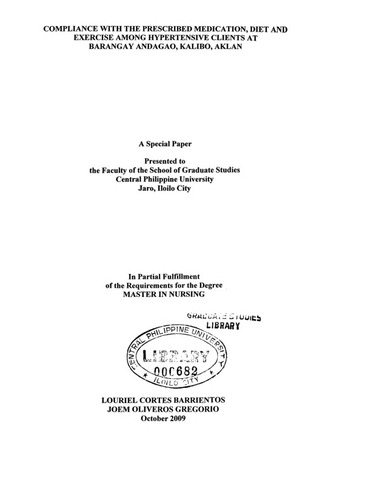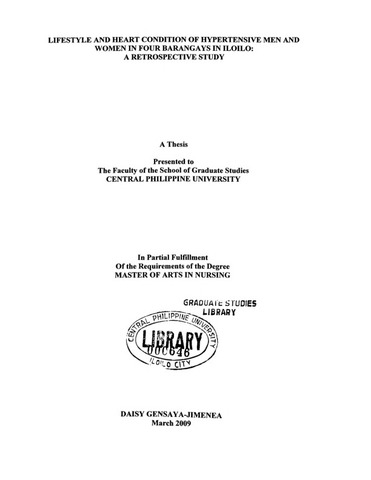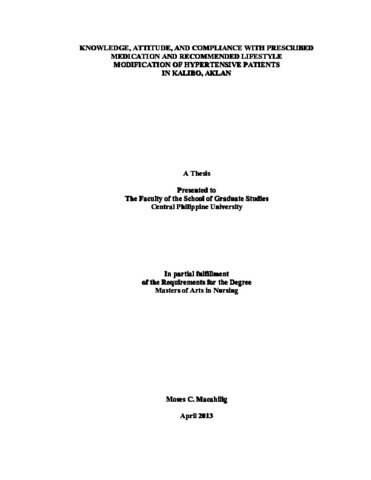| dc.description.abstract | This study attempted to determine factors that could influence compliance of hypertensive clients with the prescribed medication, diet and exercise at Barangay Andagao, Kalibo, Aklan. Specifically, this study aimed to describe the personal characteristics, level of knowledge, attitude and compliance with the prescribed medication regimen, diet and exercise among hypertensive clients. Further, this study determined whether there is variation in the level of knowledge, attitude, and compliance of the respondents according to their personal characteristics such as age, sex, civil status, family income, and educational attainment. Furthermore the relationships between major variables were also determined.
This is a descriptive-correlation study which employed the pre-survey design. The survey was conducted from December 17-19, 2008, among the 33 hypertensive clients. Interview schedule was used as data gathering instruments.
The data were processed and analyzed by the use of SPSS version 14.0. Descriptive statistics such as mean, frequency, percentage were utilized to describe the personal characteristics, knowledge, attitude and compliance. To determine the variation and relationship between major variables Z test and Chi-square test were utilized respectively.
Major Findings
1. Majority of the respondents were female, married, 60 years old and below, had a family income of Php 10,000 and below and had reached elementary level of education.
2. Majority (72.7 percent) of them had an average level of knowledge about hypertension, diet (66.7 percent), and exercise (66.7 percent) while a higher proportion (63.6 percent) of respondents had low knowledge when it comes to medication regimen. The overall knowledge about hypertension, medication regimen, diet and exercise was average as indicated by their mean of 15.33.
3. Almost seven in every ten (69.7 percent) respondents had unfavorable attitude towards their medication regimen. There were high proportions of respondents who had both favorable attitudes towards diet (54.5 percent) and exercise (87.9 percent). The general results showed that majority (84.8 percent) of the respondents had favorable attitude towards medication regimen, diet and exercise while only 15.2 percent had an unfavorable attitude.
4. A little more than one half (51.5 percent) of the respondents were compliant with the prescribed medication regimen. Majority (57.6 percent) of them were non compliant with their recommended diet, while most of them (63.6 percent) were compliant to their recommended exercise. In general, all of the respondents were noncompliant with the prescribed medication regimen, diet and exercise.
5. The level of knowledge of respondents regarding hypertension, medication regimen, diet and exercise did not significantly vary according to age, sex, civil status, family income and educational attainment.
6. The attitude of the respondents towards medication regimen, and diet did not show any variation according to their personal characteristics. Furthermore, the respondents attitude towards exercise do not significantly vary according to sex, family income and educational attainment, however, it differs according to age and civil status where those 60 years old and below and were single with favorable attitude had higher proportion (100 percent) than those 61 years old and above and were married (75.0 percent, 86.7 percent).
7. The respondents’ compliance with the prescribed medication regimen did not significantly differ according to age, sex, family and educational attainment except for civil status which revealed significant difference (Z test value = 1.99) where single respondents were more compliant in taking their medicines than the married ones. The compliance of the respondents towards their recommended diet and exercise show no significant variation according to their personal characteristics.
8. The respondents’ level of knowledge about hypertension, medication regimen, diet, exercise and compliance with the prescribed medication regimen, diet and exercise showed no significant relationship.
9. There is no significant relationship between the respondents’ attitude towards medication regimen, diet and exercise and compliance with the prescribed medication regimen, diet and exercise. xiv
10. The respondents’ knowledge about hypertension, medication regimen, diet and exercise and attitude towards medication regimen, diet and exercise revealed no significant relationship.
Conclusions
Based on the findings of the study, the following conclusions are drawn:
The respondents who were affected with hypertension are female, married, elementary educated, 60 years old and below, and have family income of Php 10,000 and below.
This means that most of them belong to poverty threshold according to National Statistics Coordinating Board which states that in every 5 members of the family their income should be Php 14, 500.00. Further, those with low education were affected too for they are not aware as to the possible consequence of untreated hypertension as well as the risk of discontinuing the medication without the physician’s order.
A little less than half of them who did not comply in taking their drugs cannot not afford to buy the expensive medications prescribed to them. Majority of the reasons of those respondents who are noncompliant with the prescribed diet was that they cannot resist their appetite. This means that they have poor self-control towards food. Most of their rationale for not exercising was that they have many work to do which suggest that they do not allocate time for themselves to engage in exercise.
The respondents have average knowledge about hypertension, diet and exercise. Although a higher proportion of the respondents are aware about the disease as well as to their prescribed diet and exercise yet majority of them remain to have inadequate information particularly about anti-hypertensive drugs as to their names, actions and side effects.
Most of the hypertensive individuals had unfavorable attitude towards medication regimen although majority of them have favorable attitude in terms of seeking medical advice when they experience discomfort after taking the medications, that taking drugs is no longer necessary once they feel well, and that they look for ways in order to buy their medicines. Still, a significant number of them need to improve their beliefs about the importance of taking the medications regularly; that there is a need to rest after taking it and that medication should be taken even if their blood pressure is normal. Furthermore, majority of them had favorable attitude towards diet and exercise, however, they need to be convinced that eating fatty and salty foods once in a while could increase their blood pressure and that exercise must be done for at least 30-45 minutes three times a week.
More than half of the respondents were compliant in taking their prescribed medicines and are engaging in regular exercise. This suggests that they are aware of the importance of keeping themselves healthy and functional so that they will be able to help improve the quality of their family’s life. However, they are noncompliant in following their prescribed diet which implies that they just eat all the foods being prepared and served for them.
Respondents’ knowledge about hypertension, medication regimen, diet and exercise did not reveal any variation according to their personal characteristics. This implies that personal characteristics in terms of age, sex, civil status, family income and educational attainment cannot be used to identify who among them are knowledgeable and not knowledgeable. However, their attitudes towards exercise significantly differ according to age and civil status. Those who belong to 60 years old and below and were single had favorable attitude. Further, the respondents compliance to the prescribed medication regimen shows a discrepancy where those singles are more compliant than the married ones.
The level of compliance among the respondents significantly vary only according to their civil status. Single hypertensive individuals are more compliant in taking their medicines because they have ample time to take care of themselves and they have a less responsibility compared to those who are married.
There is no significant relationship between knowledge and attitude towards hypertension, medication regimen, diet and exercise and compliance to it. There is also no significant relationship between knowledge and attitude of the respondents. | en_US |





